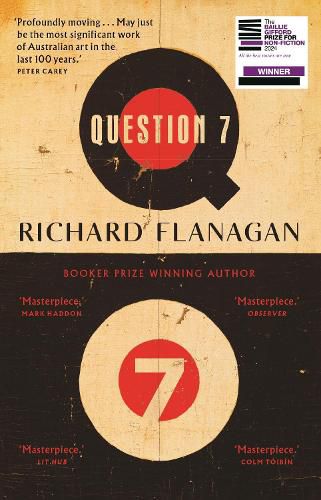Readings Newsletter
Become a Readings Member to make your shopping experience even easier.
Sign in or sign up for free!
You’re not far away from qualifying for FREE standard shipping within Australia
You’ve qualified for FREE standard shipping within Australia
The cart is loading…






Winner of the Baillie Gifford Prize 2024
Beginning at a love hotel by Japan's Inland Sea and ending by a river in Tasmania, Question 7 is about the choices we make about love and the chain reaction that follows.
By way of H. G. Wells and Rebecca West's affair through 1930s nuclear physics to Flanagan's father working as a slave labourer near Hiroshima when the atom bomb is dropped, this genre-defying daisy chain of events reaches fission when Flanagan as a young man finds himself trapped in a rapid on a wild river not knowing if he is to live or to die.
At once a love song to his island home and to his parents, this hypnotic melding of dream, history, literature, place and memory is about how reality is never made by realists and how our lives so often arise out of the stories of others and the stories we invent about ourselves.
$9.00 standard shipping within Australia
FREE standard shipping within Australia for orders over $100.00
Express & International shipping calculated at checkout
Winner of the Baillie Gifford Prize 2024
Beginning at a love hotel by Japan's Inland Sea and ending by a river in Tasmania, Question 7 is about the choices we make about love and the chain reaction that follows.
By way of H. G. Wells and Rebecca West's affair through 1930s nuclear physics to Flanagan's father working as a slave labourer near Hiroshima when the atom bomb is dropped, this genre-defying daisy chain of events reaches fission when Flanagan as a young man finds himself trapped in a rapid on a wild river not knowing if he is to live or to die.
At once a love song to his island home and to his parents, this hypnotic melding of dream, history, literature, place and memory is about how reality is never made by realists and how our lives so often arise out of the stories of others and the stories we invent about ourselves.
Sometimes, a work of nonfiction feels like a magic trick. While novels can weave poignant, transcendent stories from little more than an author’s imagination, it is something entirely different, something almost miraculous, when that same transcendence is wrought from the stony face of fact and history, when the reality of memories and moments and lives is somehow coalesced into a thing more beautiful than the sum of its parts. Richard Flanagan’s Question 7 is that magic trick made manifest, a profound journey that draws its meandering path through tragedies great and small, from the skies above Hiroshima to the rivers of Tasmania.
Preoccupied, like so many others in recent years, with the staggering atrocities of nuclear warfare and informed by the timeless fourth tense used in the language of the Yolngu people, Flanagan’s writing spirals outwards from that grim morning in August when they dropped the bomb, effortlessly ‘confounding’ time to link each fragment of history responsible for our present. Before Hiroshima, there was Leo Szilard, the first scientist to see the destructive potential of nuclear chain reactions, who was in turn inspired by H.G. Wells, whose imagination created the first visions of the atomic bomb. After Hiroshima is Flanagan himself, born of a father whose life, as a Japanese prisoner of war, was saved by the blast that killed countless others. From Wells to Szilard to Hiroshima to father to son – Flanagan presents history as a line of cause and effect that becomes a circle when inscribed on the land of Tasmania, whose bloody history of attempted genocide inspires one author who in turn, births another, haunted by that same genocide. In the words that echo throughout the book: ‘life is always happening and has happened and will happen.’
There’s more in this magnificent work I haven’t mentioned: questions of love and Chekhov, memories that animate and contextualise Flanagan’s fiction, and impassioned calls for unity and resistance alike. The ideas shine, the prose dazzles, but is that really a surprise? In truth, Question 7 cannot be fully captured by any writing except its own: like any magic trick, you must see it for yourself.
See what the Readings’ team have to say on the blog, discover related events and podcast episodes.
We've run the reports and crunched the numbers. Here are our 100 bestselling books for 2024!
Discover these critically acclaimed works of fiction, nonfiction and poetry that have received accolades in Australia and beyond.
Delve into fascinating stories from the last century with these history books from around the world.